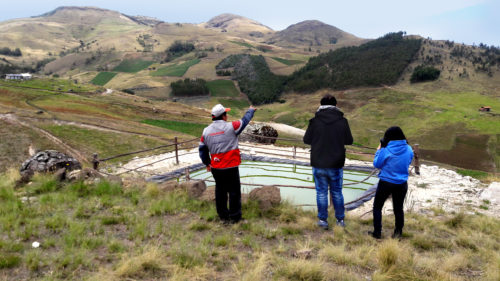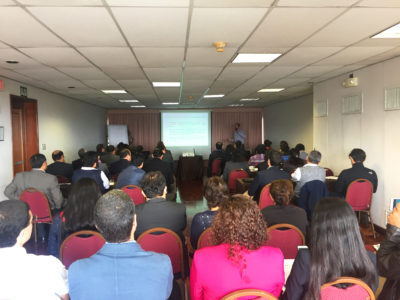
Workshop addresses the relationship between social programs, agriculture and innovation
The Government of Peru has set the following goals for 2021: reduce monetary poverty (from 20.7% to 15%), extreme poverty (from 3.8% to 1.5%), rural poverty (from 43% to 37.9%), chronic malnutrition in children under 5 (from 13% to 6%) and anemia in children under 3 (from 43% to 19%). Achieving these reductions will require economic processes that link public policies for the protection of vulnerable populations, for social and economic inclusion in productive sectors, and to expand access to and the quality of basic services.
To contribute to these goals, the International Potato Center (CIP) and Peru’s Ministry of Development and Social Inclusion (MIDIS) organized a workshop on “Social protection programs and economic inclusion interventions in rural areas in Peru,” held on December 5. The event was part of ongoing collaboration between MIDIS and CIP’s Latin America Region and Social Sciences and Nutrition teams in Peru that is based on a philosophy that innovation in agriculture is fundamental for reducing hunger and poverty rates, and the most effective way to facilitate opportunities for creating income and improving nutrition in vulnerable populations.
 The workshop provided participants with a panoramic, conceptual and operational vision of various programs around the world that link social protection policies with innovation interventions and economic development in agriculture. In particular, some recent experiences in the Andean region of relevance to Peru were analyzed. The workshop sought to draw lessons from those programs that can be applied to the Anemia Cero (Zero Anemia) initiative promoted by MIDIS in partnership with CIP, the World Food Program (WFP), the Inter-American Development Bank (IDB) and local institutions in the Curgos District of Peru’s La Libertad region.
The workshop provided participants with a panoramic, conceptual and operational vision of various programs around the world that link social protection policies with innovation interventions and economic development in agriculture. In particular, some recent experiences in the Andean region of relevance to Peru were analyzed. The workshop sought to draw lessons from those programs that can be applied to the Anemia Cero (Zero Anemia) initiative promoted by MIDIS in partnership with CIP, the World Food Program (WFP), the Inter-American Development Bank (IDB) and local institutions in the Curgos District of Peru’s La Libertad region.
To facilitate the analysis of these issues, participants spent the morning listening to and discussing the following presentations: “State of art and experiences of Social Protection Programs at the global level: Concepts, methods and results in other continents (Asia and Africa)” by Alejandra Arrieta of the International Food Policy Research Institute (IFPRI); “Analysis of social protection programs in Peru and their relationship with economic inclusion interventions: Balance of the last 10 years,” by Ricardo Fort, of the Group for Analysis of Development (GRADE); “Experiences with food security and agriculture-nutrition interventions in Peru” by Miguel Ordinola, of CIP; and “Presentation of the Zero Anemia pilot in the district of Curgos, La Libertad” by Milenka Eslava, of MIDIS. In the afternoon, the focus turned to working with MIDIS officials on the principles for an impact evaluation of this type of project using cases developed by IFPRI.
Approximately 45 people attended the workshop, primarily officials and technical staff from various government institutions, international organizations and research centers. The workshop included the participation of representatives of IFPRI, based in Washington D.C., as part of the Research Program on Policies, Institutions and Markets (PIM). IFPRI promotes research and the development of policies that improve the welfare of vulnerable populations in the developing world. PIM has a specific line of research that articulates social protection policies with agricultural innovation. During the workshop, IFPRI presented the conceptual frameworks and results of research in Bangladesh, Brazil, Ecuador, Ethiopia, Lesotho, Mail and Mexico.
María Eugenia Mujica, Vice Minister of Policies and Social Evaluation at MIDIS, closed the meeting with a summary that highlighted the relationship between agricultural interventions and poverty reduction, and the importance of working with local actors, linking social and productive interventions, measuring impacts, and generating evidence through solid research.
Among the next steps planned under CIP’s collaboration with MIDIS are a workshop to be held en early 2018 to plan and elaborate the project’s theory of change, and a training in methodologies for evaluating social protection and agricultural interventions, which will include the participation of IFPRI.
